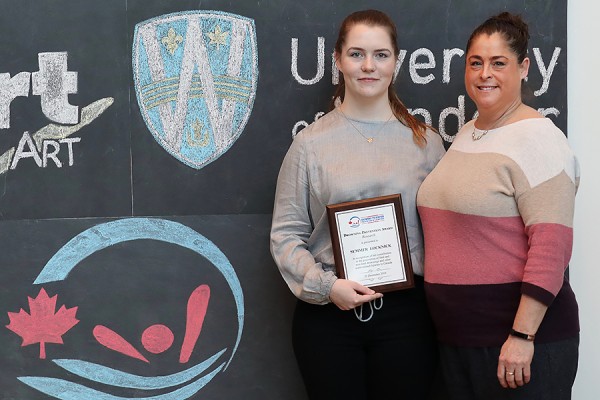 Summer Locknick receives a Drowning Prevention Award from Cynthia Cakebread, vice president of member services for the Lifesaving Society.
Summer Locknick receives a Drowning Prevention Award from Cynthia Cakebread, vice president of member services for the Lifesaving Society.
A graduate student in the School of the Environment was the recipient of a research award acknowledging her accomplishments in the study of rip currents. Rip currents occur on any beach that has breaking waves across a wide area and are responsible for a majority of drownings and rescues every year.
Summer Locknick, a master’s candidate in earth sciences, studies rip currents on Prince Edward Island and through her research was the recipient of the 2019 Drowning Prevention Award in Research from the Canadian Drowning Prevention Coalition.
The non-governmental organization grants the award — as well as two others in Community Action Plans and Effective Policies and Legislation — to recognize excellence and innovation in best practices and impacts in those areas.
“Prince Edward Island sees a large number of tourists every summer,” says Locknick. “And rip currents are a major health hazard to these beach goes, as swimmers can be caught in the rips which puts them at risk of drowning due to fatigue and disorientation.”
Cynthia Cakebread, vice president of member services for the Lifesaving Society, presented the award to Locknick in the Essex CORe atrium on Dec. 20.
“Ms. Locknick’s graduate study is the first to examine the relationship between the presence and location of rip currents, beach user intentions, and the lifeguard-defined hazard level,” says Cakebread.
Locknick’s research focuses on the relationship amongst the presence and location of rips, beach user intentions and the lifeguard-defined hazard level.
“We hope that through this research we can reduce the number of drownings related to rip currents and other surf hazards through the effective deployment of lifesaving strategies and increasing public confidence in rip hazard predictions,” says Locknick.
—Darko Milenkovic
